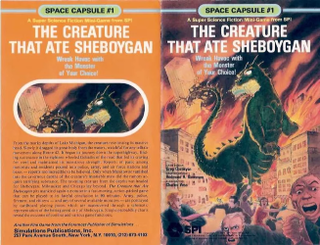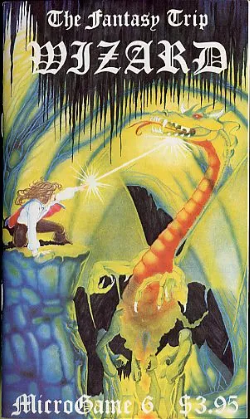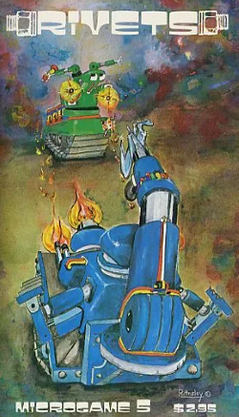
Sticks & Stones is a board wargame published by Metagaming Concepts in 1978 that is set in the Neolithic Age.

Sticks & Stones is a board wargame published by Metagaming Concepts in 1978 that is set in the Neolithic Age.
Sticks & Stones is a two-player microgame in which rival Stone Age tribes vie with each other. It was the first board game featuring a Neolithic setting. [1]
The ziplock bag contains: [2]
The game includes five scenarios: [2]
Each player buys warriors and weapons using a pool of points. Turns are played in standard "I go, You go" format — one player moves and fights, then the other player moves and fights. Combat is resolved with a Combat Result Table and a die roll.
Each warrior counter has two damage points. The first time a unit is hit, the counter is turned over to indicate it is damaged. The next time it is hit, the counter is removed from the board.
Victory conditions vary from scenario to scenario, and may involve the capture of villagers and goods rather than the outright elimination of the opposing warriors. [2]
In 1977, Metagaming Concepts pioneered a new type of small, fast and cheap wargame packaged in a ziplock bag titled Ogre . It proved popular, and Metagaming produced more games in what they called the MicroGame series. Sticks & Stones was the 11th game in the series, designed by David Ray, with interior and cover art by Pat Hidy. [3]
After Metagaming Concepts went out of business, Hobby Japan acquired the rights to the game and in 1987 published a Japanese-language edition both as a boxed set and as a pullout game in Tactics magazine. [3]
In Issue 35 of Warning Order, Matt Irsik was not sure the game was "sci-fi" enough for him, but ended up liking the game because "the game system works." He concluded, "On the surface you wouldn’t think that this would be a great game as it deals with stone age man to man combat, but it is actually pretty good." [4]
In Issue 27 of Simulacrum, Brian Train commented, "This is a good stand-alone game on the topic, in fact the only one I found that dealt exclusively with Neolithic warfare. I had quite a bit of fun with it when I first got mine." Train also noted, "There are some interesting chrome rules for capture of dependents, goats and goods, roaming goats, poisoned weapons, and fire." [5]
David Lent and Len Krol of Centurion's Review did not like the thin cardstock counters, which they felt were too small and too thin to handle easily. They also noted that the counters were not double-sided, so that damaged counters showed a blank white side, making it hard to remember which counters were which. They also thought the map's hex grid was too small, and that set-up took too long — often longer than the actual game. On the plus side, they found the rules simple, well-written and easy to learn, and games were fast and enjoyable. Lent and Krol concluded, "If you see a copy, buy it." [2]
A copy of Sticks & Stones is held in the collection of the Strong National Museum of Play, a gift of Darwin Bromley and Peter Bromley. [7]

G.E.V. is a science fiction board wargame that simulates combat in the near future between armored hovercraft, supertanks and other futuristic weaponry.

Hitler's War is a strategic level World War II board wargame first published by Metagaming Concepts in 1981, and then by Avalon Hill in 1984 that simulates the war from Operation Barbarossa to the Fall of Berlin. Critical reception was general favorable, using phrases like "very good", "An incredible bang for the buck", "single most satisfying game of its type" and "well thought out."

Cry Havoc is a board wargame published by Standard Games and Publications in 1981 that uses a complex set of rules to simulate medieval one-on-one combat.

The Creature That Ate Sheboygan is a science fiction board game released in 1979 by Simulations Publications (SPI). The game received good reviews and won an industry award.

WarpWar is a science fiction board wargame published by Metagaming Concepts in 1977 that simulates interstellar combat. It was the fourth in Metagaming's MicroGame series.

Melee is a board wargame designed by Steve Jackson, and released in 1977 by Metagaming Concepts. In 2019, Melee was revived and re-released by Steve Jackson Games.

Wizard is a board game system of medieval fantasy magical combat published by Metagaming in 1978 that was designed to complement the previously published Melee, a system of melee combat rules. Forty years later, Wizard was revived and re-released by Steve Jackson Games.

The Ythri is a board wargame published by Metagaming Concepts in 1975 that is based on the 1973 science fiction novel The People of the Wind by Poul Anderson.

Chitin: I is a science fiction microgame published by Metagaming Concepts in 1977 in which bands of intelligent insects vie for resources.

Annihilator & OneWorld are two board wargames released in one package by Metagaming Concepts in 1979 as the 14th addition to its MicroGame line.

Holy War is a science fiction board wargame published by Metagaming Concepts in 1979 in which two groups battle each other inside a pocket universe.

Olympica, subtitled "The U.N. Raid on Mars, 2206 A.D.", is a science fiction microgame published by Metagaming Concepts in 1978.

Invasion of the Air-eaters is a science fiction near-future board wargame published by Metagaming Concepts in 1979 in which aliens invaders attempt to replace the oxygen in Earth's atmosphere with sulfur dioxide.

Rivets is a post-apocalyptic board wargame published by Metagaming Concepts in 1977.

Ram Speed, subtitled "Naval Warfare in the Bronze Age", is a two-player microgame published by Metagaming Concepts in 1980 that simulates naval combat between galleys in the Mediterranean during the Bronze Age when the preferred method of attack was ramming a ship.

Dimension Demons is a science fiction board wargame published by Metagaming Concepts in 1981 as part of its MicroGame line.

Space Empires is a science fiction board game published by Mayfair Games in 1981.

Helltank Destroyer is a science fiction board wargame published by Metagaming Concepts in 1982 as part of its MicroGame line that features combat between supertanks and other futuristic weapons systems. The game is a sequel to 1981's Helltank, which is itself based on Ogre.

Starleader: Assault! is a science fiction microgame published by Metagaming Concepts in 1982 that was designed to introduce the rules of combat with firearms for a forthcoming science fiction role-playing game that did not get published before Metagaming went out of business.

Arcola, The Battle for Italy 1796 is a board wargame published by Operational Studies Group (OSG) in 1979 and republished by Avalon Hill in 1983 that is a simulation of the Battle of Arcola between French and Austrian forces in 1796. The game was designed to tempt players to purchase OSG's previously published and larger wargame Napoleon in Italy.